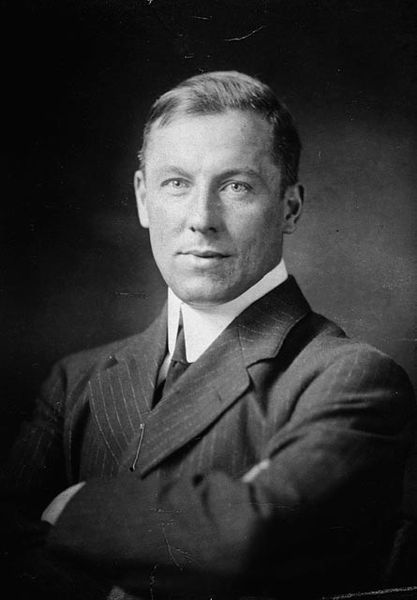By
Beth Green
In
poetry, as well as novels, I look for verse that takes me to another
place; for a lyrical transportation to another time.
It’s
no wonder then, that one of the poets whose writing has echoed in my
thoughts the most is Canadian Robert W. Service.
 |
| Robert W. Service |
A
contemporary of American novelist Jack London (White Fang, The
Call of the Wild―also great adventure tales), Service wrote the
poems that made him famous about the Gold Rush of the late 1800s.
Originally Scottish, Service was an adventurer from a young age. He
traveled and worked at various jobs in North America, eventually
landing work as a banker in the wild north. His poetry―he actually
preferred to call it “verse”―is often compared to (or dismissed
as) similar to Rudyard Kipling’s in tone, audience and meter.
But
the thing that captures me most about Service’s many poems about
the Yukon is his sense of adventure. Consider the opening to “A
Rolling Stone,” published in 1912.
There's sunshine in the heart of me,
My blood sings in the breeze;
The mountains are a part of me,
I'm fellow to the trees.
My golden youth I'm squandering,
Sun-libertine am I;
A-wandering, a-wandering
Until the day I die.
Service’s
poems also brought the world a cast of characters―sometimes
desperate―who acted out the dance of life in sub-zero conditions.
One of his first famous poems, “The Cremation of Sam McGee,”
(1907) tells the story of the death of a gold miner:
Now
Sam McGee was from Tennessee, where the cotton blooms and blows.
Why he left his home in the South to roam 'round the Pole, God only knows.
He was always cold, but the land of gold seemed to hold him like a spell;
Though he'd often say in his homely way that he'd "sooner live in hell".
Why he left his home in the South to roam 'round the Pole, God only knows.
He was always cold, but the land of gold seemed to hold him like a spell;
Though he'd often say in his homely way that he'd "sooner live in hell".
 |
| Southeast Alaska. Photo by Beth Green |
Having
lived in Alaska, I feel that his poetry also illustrates the
beauty of North America―particularly Alaska, British Columbia and
the Yukon―better than any other writer I’ve read. My favorite
example of this is his epic “The Spell of the Yukon,” published
in 1907.
The
Spell of the Yukon
I
wanted the gold, and I sought it;
I
scrabbled and mucked like a slave.
Was
it famine or scurvy―I fought it;
I
hurled my youth into a grave.
I
wanted the gold, and I got it―
Came
out with a fortune last fall,―
Yet
somehow life’s not what I thought it,
And
somehow the gold isn’t all.
 |
| A glacier. Photo by Beth Green |
No!
There’s the land. (Have you seen it?)
It’s
the cussedest land that I know,
From
the big, dizzy mountains that screen it
To
the deep, deathlike valleys below.
Some
say God was tired when He made it;
Some
say it’s a fine land to shun;
Maybe;
but there’s some as would trade it
For
no land on earth―and I’m one.
You
come to get rich (damned good reason);
You
feel like an exile at first;
You
hate it like hell for a season,
And
then you are worse than the worst.
It
grips you like some kinds of sinning;
It
twists you from foe to a friend;
It
seems it’s been since the beginning;
It
seems it will be to the end.
I’ve
stood in some mighty-mouthed hollow
That’s
plumb-full of hush to the brim;
I’ve
watched the big, husky sun wallow
In
crimson and gold, and grow dim,
Till
the moon set the pearly peaks gleaming,
And
the stars tumbled out, neck and crop;
And
I’ve thought that I surely was dreaming,
With
the peace o’ the world piled on top.
The
summer―no sweeter was ever;
The
sunshiny woods all athrill;
The
grayling aleap in the river,
The
bighorn asleep on the hill.
The
strong life that never knows harness;
The
wilds where the caribou call;
The
freshness, the freedom, the farness―
O
God! how I’m stuck on it all.
The
winter! the brightness that blinds you,
The
white land locked tight as a drum,
The
cold fear that follows and finds you,
The
silence that bludgeons you dumb.
The
snows that are older than history,
The
woods where the weird shadows slant;
The
stillness, the moonlight, the mystery,
I’ve
bade ’em good-by―but I can’t.
 | |
| Mountains above Juneau, AK. |
There’s
a land where the mountains are nameless,
And
the rivers all run God knows where;
There
are lives that are erring and aimless,
And
deaths that just hang by a hair;
There
are hardships that nobody reckons;
There
are valleys unpeopled and still;
There’s
a land―oh, it beckons and beckons,
And
I want to go back―and I will.
They’re
making my money diminish;
I’m
sick of the taste of champagne.
Thank
God! when I’m skinned to a finish
I’ll
pike to the Yukon again.
I’ll
fight―and you bet it’s no sham-fight;
It’s
hell!―but I’ve been there before;
And
it’s better than this by a damsite―
So
me for the Yukon once more.
There’s
gold, and it’s haunting and haunting;
It’s
luring me on as of old;
Yet
it isn’t the gold that I’m wanting
So
much as just finding the gold.
It’s
the great, big, broad land ’way up yonder,
It’s
the forests where silence has lease;
It’s
the beauty that thrills me with wonder,
It’s
the stillness that fills me with peace.
 |
| Southeast Alaska |